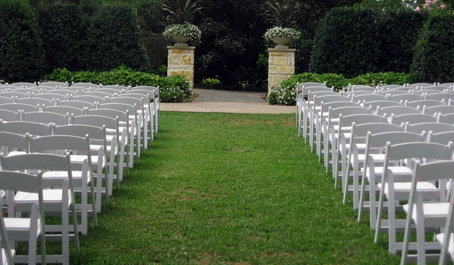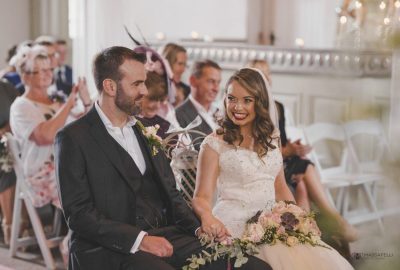
Planning a civil wedding ceremony in Ireland, and wondering what your options are?
In Ireland, couples getting married have the option to have a religious or civil ceremony. Religious ceremonies account for approximately 75% of all marriages in Ireland each year, but with changes in regulations, civil ceremonies are on the increase.
Until recent years couples could only marry in a church or have a civil ceremony in a registry office. Couples could have a ceremony or blessing at a separate venue, but still had to attend a registry office to make the marriage official for the State. However, with the Civil Registration Act 2004 coming into law in 2007, couples now have a choice. But don’t get too excited the legislation states that weddings must take place in a fixed structure, ruling out open air and marquee weddings.
The Venue
If you choose to hold your civil ceremony in a venue other than a Registry Office, certain regulations apply.
The venue must meet the following guidelines:
- It must be a fixed structure.
- It must be seemly and dignified.
- It must allow unrestricted public access without charge.
- It must meet all relevant health and safety requirements.
- It must have adequate public liability insurance.
These requirements rule out open air venues, tents, marquees, private dwellings and temporary structures.
If you wish to hold your civil ceremony in a venue other than the Registry Office you must arrange to have the venue approved by the local Registrar. This may involve the Registrar inspecting the venue. Today, numerous hotels offer rooms to be used to hold the civil ceremony. There will be an additional fee for a civil ceremony held in a venue other than a Registry Office.
The State Regulations
Like a religious ceremony, a civil ceremony must be solemnised by a listed solemniser. The officiant must be on the register of solemnisers available on the General Registrar Office
Along with arranging your civil ceremony with the registrar, you must also give 3 months notice to the State. This is done by appointment with your local Registrar.
Once the 3 months notification and all other requirements are met, the Registrar will issue you with a Marriage Registration Form (MRF) giving you permission to marry. You should give the MRF to the Registrar who will be solemnising the marriage before the marriage ceremony.
The Marriage Ceremony
As there is no mass or Eucharist as part of a civil ceremony, it is generally much shorter than a church wedding. A civil ceremony also allows the couple more freedom to personalise the ceremony with prayers, poems or songs.
The general format for a civil ceremony is as follows:
- Opening Words of the Officiant (Solemniser)
- The Giving in Marriage (Optional)
- Opening Prayer or Reading
- Definition of Marriage
- Wedding Vows
- Second Reading
- Exchange of Rings
- Lighting of Unity Candle
- Declaration of Marriage
- Introduction of Newlyweds
The ceremony is solemnised by the Registrar. The ceremony must be performed in the presence of two witnesses aged 18 or over. During the ceremony the couple must make two declarations:
- That you do not know of any impediment to the marriage
- That you accept each other as husband and wife
Immediately after the marriage ceremony, the MRF should be signed by the couple, the two witnesses and the Registrar. The Registrar will register the marriage as soon as possible after the marriage.

